(完整版)青少版新概念2AUnit1知识点总结
- 格式:doc
- 大小:40.74 KB
- 文档页数:2
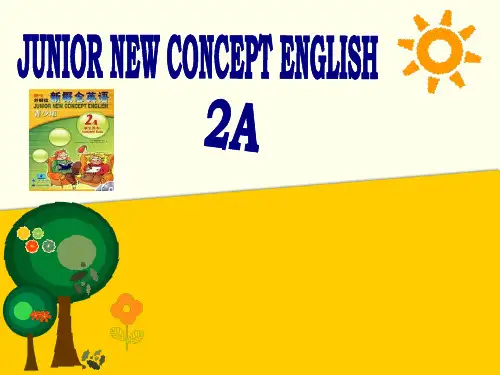

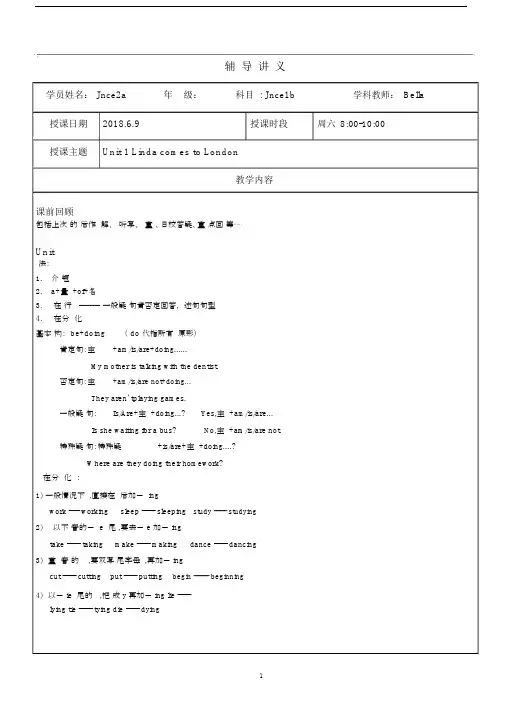
辅导讲义学员姓名: Jnce2a年级:科目: Jnce1b学科教师:Bella 授课日期2018.6.9授课时段周六8:00-10:00授课主题Unit 1 Linda comes to London教学内容课前回顾包括上次的后作解、听写、重、日校答疑、重点回等⋯⋯Unit法:1.介短2.a+量 +of+名3.在行————一般疑句肯否定回答,述句句型4.在分化基本构: be+doing(do代指所有原形)肯定句:主+am/is/are+doing......My mother is talking with the dentist.否定句:主+am/is/are not+doing...They aren’tplaying games.一般疑句:Is/Are+主 +doing...? Yes,主 +am/is/are...Is she waiting for a bus?No,主 +am/is/are not.特殊疑句:特殊疑+is/are+主 +doing....?Where are they doing their homework?在分化:1)一般情况下 ,直接在后加- ingwork ---- working sleep ----- sleeping study ----- studying2)以不音的- e 尾 ,要去- e 加- ingtake ----- taking make ----- making dance ----- dancing3)重音的 ,要双写尾字母 ,再加- ingcut ----- cutting put ----- putting begin ------ beginning4)以- ie 尾的 ,把成 y 再加- ing lie -----lying tie ----- tying die ----- dying:next to 靠⋯旁,挨着 wait for 等待 come round 来到附近 stand up 起立,站起来 come out 出来 sit 坐 phone TV Sandwich 三明治 read listen to 听Arrivals (机的)港exit出口Baggage Hall行李取suitcase 手提箱,皮箱armchair扶手椅重点句型:★ What are you doing?I'm ⋯.★ What is sb. doing?He / She is ⋯.★Is Paul eating a sandwich?★What is Paul doing?作:1.微信熟 P.2.背短,下听写3.完成册4.每天听音料 10 分并大声跟。
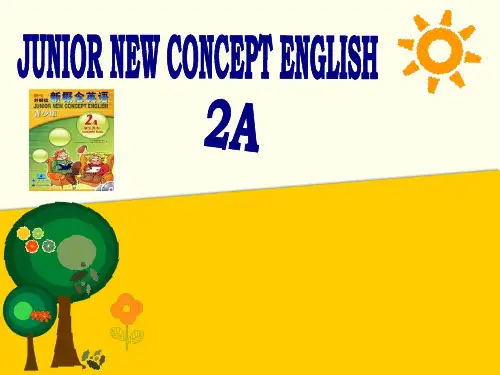
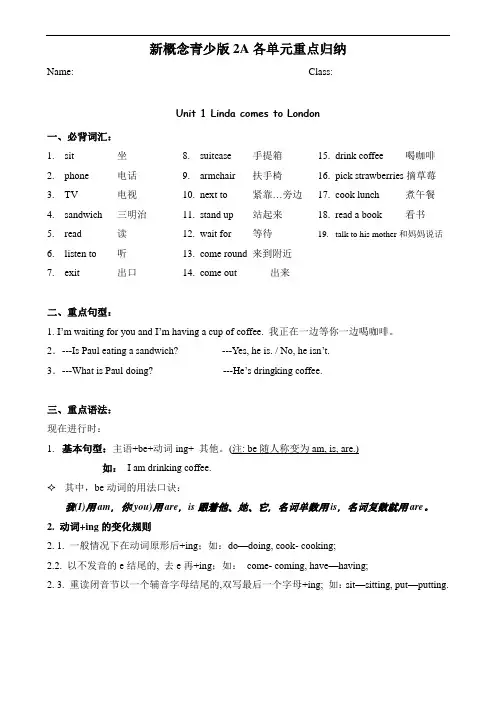
新概念青少版2A各单元重点归纳Name:___________________ Class:___________________Unit 1 Linda comes to London一、必背词汇:1.sit 坐2.phone 电话 电视4.sandwich 三明治5.read 读6.listen to 听7.exit 出口8.suitcase 手提箱9.armchair 扶手椅10.next to 紧靠…旁边11.stand up 站起来12.wait for 等待e round 来到附近e out 出来15.drink coffee 喝咖啡16.pick strawberries摘草莓17.cook lunch 煮午餐18.read a book 看书19.talk to his mother和妈妈说话二、重点句型:1. I’m waiting for you and I’m having a cup of coffee. 我正在一边等你一边喝咖啡。
2.---Is Paul eating a sandwich? ---Yes, he is. / No, he isn’t.3.---What is Paul doing? ---He’s dringking coffee.三、重点语法:现在进行时:1.基本句型:主语+be+动词ing+ 其他。
(注: be随人称变为am, is, are.)如:I am drinking coffee.其中,be动词的用法口诀:我(I)用am,你(you)用are,is跟着他、她、它,名词单数用is,名词复数就用are。
2. 动词+ing的变化规则2. 1. 一般情况下在动词原形后+ing;如:do—doing, cook- cooking;2.2. 以不发音的e结尾的, 去e再+ing;如:come- coming, have—having;2. 3. 重读闭音节以一个辅音字母结尾的,双写最后一个字母+ing; 如:sit—sitting, put—putting.Unit 2 Good luck on Sunday!一、重点词汇:1.visit 参观,访问2.visitor 参观者3.noisy 嘈杂的4.village 村庄ugh 大笑6.film 电影7.say 说话8.town 市镇,城镇9.city 城市10.radio 收音机11.learn 学习12.news 新闻13.quiet 安静的14.television 电视机15.luck 运气16.center 中心e home 回家18.listen to the radio听收音机19.learn English 学习英语20.watch the news 看新闻21.play football 踢足球22.have lunch 吃午餐23.go out 外出24.hundreds of 数以百计的25.thousands of 数以千计26.look forward to 盼望,期望二、重点句型:1. --- Are Robert and Lucy waiting for a taxi? 罗伯特和露西在等出租车么?---Yes, they are. / No, they aren’t.2. ---What are Robert and Lucy doing? 罗伯特和露西在做什么?--- They are waiting for a bus. 他们正在等公交车。
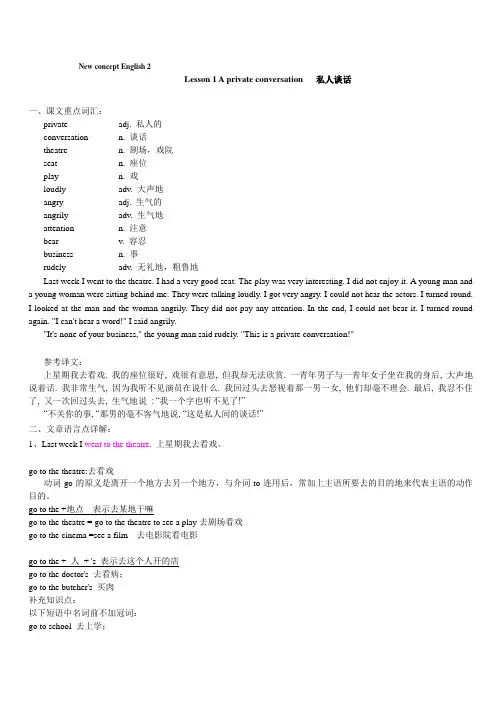
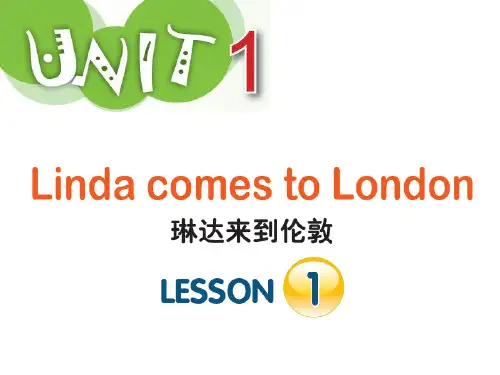
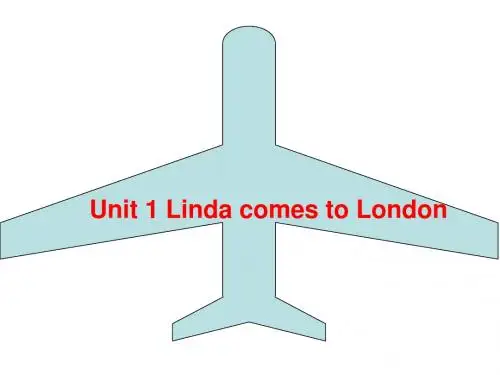
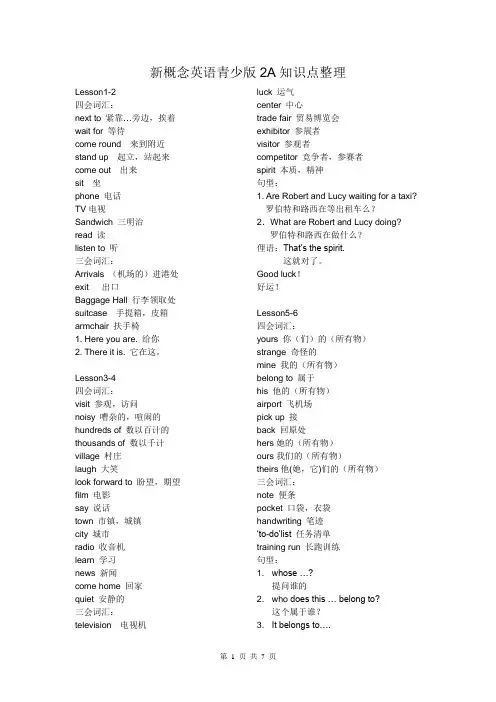
新概念英语青少版2A知识点整理Lesson1-2四会词汇:next to 紧靠…旁边,挨着wait for 等待come round 来到附近stand up 起立,站起来come out 出来sit 坐phone 电话TV电视Sandwich 三明治read 读listen to 听三会词汇:Arrivals (机场的)进港处exit 出口Baggage Hall 行李领取处suitcase 手提箱,皮箱armchair 扶手椅1. Here you are. 给你2. There it is. 它在这。
Lesson3-4四会词汇:visit 参观,访问noisy 嘈杂的,喧闹的hundreds of 数以百计的thousands of 数以千计village 村庄laugh 大笑look forward to 盼望,期望film 电影say 说话town 市镇,城镇city 城市radio 收音机learn 学习news 新闻come home 回家quiet 安静的三会词汇:television 电视机luck 运气center 中心trade fair 贸易博览会exhibitor 参展者visitor 参观者competitor 竞争者,参赛者spirit 本质,精神句型:1. Are Robert and Lucy waiting for a taxi? 罗伯特和路西在等出租车么?2.What are Robert and Lucy doing?罗伯特和路西在做什么?俚语:That’s the spirit.这就对了。
Good luck!好运!Lesson5-6四会词汇:yours 你(们)的(所有物)strange 奇怪的mine 我的(所有物)belong to 属于his 他的(所有物)airport 飞机场pick up 接back 回原处hers她的(所有物)ours我们的(所有物)theirs他(她,它)们的(所有物)三会词汇:note 便条pocket 口袋,衣袋handwriting 笔迹‘to-do’list 任务清单training run 长跑训练句型:1. whose …?提问谁的2. who does this … belong to?这个属于谁?3. It belongs to….它属于…1. let sb. do sth.2. give sb. sth. / give sth. to sb.Lesson 7-8四会词汇:hour 小时put on 穿上walk 走take off 脱下turn on 打开turn off 关掉letter 信throw away 扔掉三会词汇top three percent 最好的百分之三volunteer 自愿者Congratulations! 祝贺Well done! 做得很好!foil jacket 保暖夹克hero英雄this way 这边medal 奖章put up 挂起curtain 窗帘take down 拿下picture 图画so 非常pleased 高兴的Best wishes 最美好的祝福句型:1. Are you going to have a drink?你打算去喝些东西么?2. I’m going to have lunch.我打算去吃午餐。

新概念青少版2A各单元重点归纳Name:___________________ Class:___________________Unit 1 Linda comes to London一、必背词汇:1.sit 坐2.phone 电话 电视4.sandwich 三明治5.read 读6.listen to 听7.exit 出口8.suitcase 手提箱9.armchair 扶手椅10.next to 紧靠…旁边11.stand up 站起来12.wait for 等待e round 来到附近e out 出来15.drink coffee 喝咖啡16.pick strawberries摘草莓17.cook lunch 煮午餐18.read a book 看书19.talk to his mother和妈妈说话二、重点句型:1. I’m waiting for you and I’m having a cup of coffee. 我正在一边等你一边喝咖啡。
2.---Is Paul eating a sandwich? ---Yes, he is. / No, he isn’t.3.---What is Paul doing? ---He’s dringking coffee.三、重点语法:现在进行时:1.基本句型:主语+be+动词ing+ 其他。
(注: be随人称变为am, is, are.)如:I am drinking coffee.其中,be动词的用法口诀:我(I)用am,你(you)用are,is跟着他、她、它,名词单数用is,名词复数就用are。
2. 动词+ing的变化规则2. 1. 一般情况下在动词原形后+ing;如:do—doing, cook- cooking;2.2. 以不发音的e结尾的, 去e再+ing;如:come- coming, have—having;2. 3. 重读闭音节以一个辅音字母结尾的,双写最后一个字母+ing; 如:sit—sitting, put—putting.Unit 2 Good luck on Sunday!一、重点词汇:1.visit 参观,访问2.visitor 参观者3.noisy 嘈杂的4.village 村庄ugh 大笑6.film 电影7.say 说话8.town 市镇,城镇9.city 城市10.radio 收音机11.learn 学习12.news 新闻13.quiet 安静的14.television 电视机15.luck 运气16.center 中心e home 回家18.listen to the radio听收音机19.learn English 学习英语20.watch the news 看新闻21.play football 踢足球22.have lunch 吃午餐23.go out 外出24.hundreds of 数以百计的25.thousands of 数以千计26.look forward to 盼望,期望二、重点句型:1. --- Are Robert and Lucy waiting for a taxi? 罗伯特和露西在等出租车么?---Yes, they are. / No, they aren’t.2. ---What are Robert and Lucy doing? 罗伯特和露西在做什么?--- They are waiting for a bus. 他们正在等公交车。
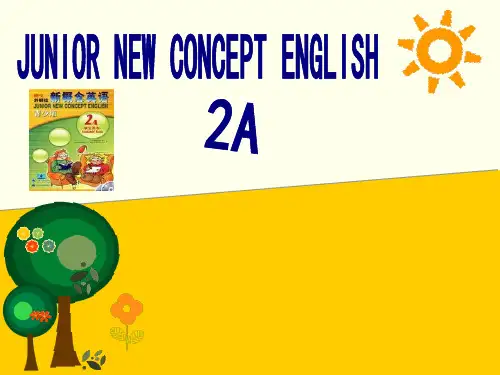
新概念2A总复习Part 1 时态1、基本结构:be+doing (do代指所有动词原形)肯定句:主语+am/is/are+doing......My mother is talking with the dentist.否定句:主语+am/is/are not+doing...They aren’t playing games.一般疑问句:Is/Are+主语+doing...? Yes,主语+am/is/are...Is she waiting for a bus? No,主语+am/is/are not.特殊疑问句:特殊疑问词+is/are+主语+doing....?Where are they doing their homework?2、动词现在分词变化规则:1)一般情况下,直接在动词后加-ingwork ---- working sleep ----- sleeping study ----- studying2) 动词以不发音的-e结尾,要去-e加-ingtake ----- taking make ----- making dance ----- dancing3) 重读闭音节的动词,要双写词尾字母,再加-ingcut ----- cutting put ----- putting begin ------ beginning4) 以-ie结尾的动词,把变成y再加-inglie ----- lying tie ----- tying die ----- dying①表示客观事实、真理②经常发生、有规律的事情1、基本结构:①带有be动词: 主语+am/is/are+肯定句:主语+am/is/are+n./adj./prep.短语...The sky is blue.My music book is in the bag.否定句:主语+am/is/are not+n./adj./prep.短语...It isn’t my magazine.The curtain isn’t clean.一般疑问句:Is/Are+主语+n./adj./prep.短语...? Yes,主语+am/is/are.Are these gloves yours? No,主语+am/is/are not.Is there any water in the jug?特殊疑问句:特殊疑问词+is/are+主语+n./adj./prep.短语....?Which one is right?Who is the man in a black hat?②带有实义动词:主语+(never/sometimes/often/usually/always)v.原形/v.三单+....(every morning/day/week.)肯定句:主语+v.原形/三单+.......They usually live in dry places. It sometimes rains in summer. 否定句:主语+don’t /doesn’t +v.原形+....... We don’t go to school on weekends.一般疑问句:Do/Does+主语+v.原形.......? Yes,主语+do/does.Do you always arrive at school very early? No,主语+don’t/doesn’t. Does Lucy have a rest every afternoon?特殊疑问句:特殊疑问词+do/does+主语+v.原形.......?Why does she always arrive so late? 2、动词第三人陈单数变化规则: 1)一般直接在动词尾直接加 s.如: play —plays, want —wants, work —works,know —knows,help —helps, get —gets2)以字母s 、x 、ch 、sh 结尾的动词加-es guess—guesses,fix—fixes,teach—teaches,brush—brushes,watch—watches,catch—catches3)以辅音字母+y 结尾的动词,先变y 为i,再加-es.发音/z/如:study—studies,carry—carries,fly—flies,worry—worries1、学生们在干什么?有一些在打电话,另一些躺在沙滩上。